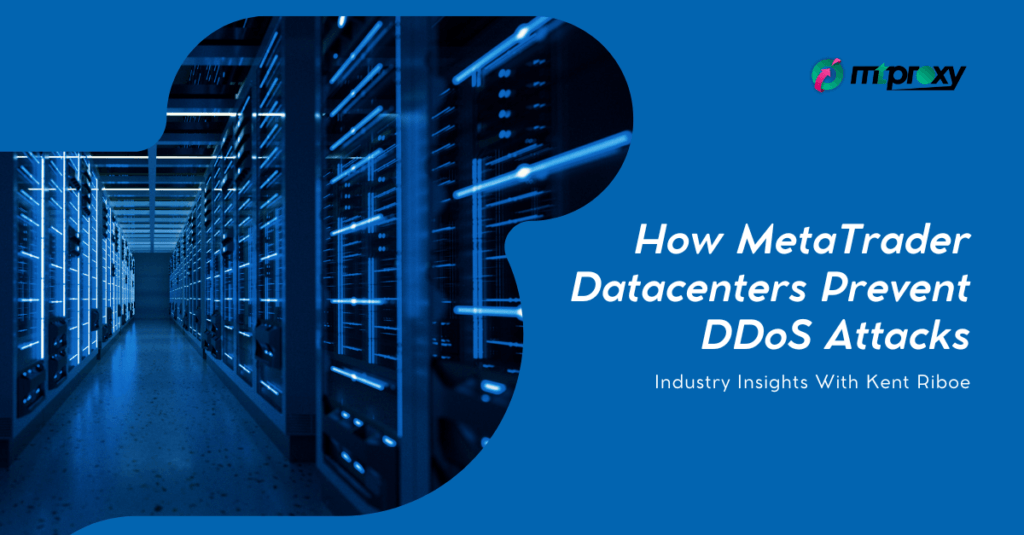In recent years, there has been an increase in the number of DDoS attacks in the forex industry. The issue has been widespread, affecting both new and established brokers, in various countries. The increase in attacks has led to an overall increase in network security issues, and increased demand for robust DDoS protection. In this article, we will explain how DDoS attacks work and how MetaTrader Datacenters offer a low-cost solution.
What is a DDoS Attack?
Distributed denial-of-service (DDoS) attacks pose a serious potential threat to your trading infrastructure. A DDoS attack is when a person (or organisation) tries to crash your company website or online services. They do this by flooding your network resources with too much traffic. The purpose of a DDoS attack is to overwhelm your servers and reduce your ability to operate online. Therefore, in business terms, the purpose of DDos attacks is to disrupt your services, inconvenience your clients, and reduce your revenue.
How Do DDoS Attacks Work?
Network resources – such as your trading servers – have limited capacity. This means that they can only process a limited number of data requests. Network connections – such as those that connect client trading platforms to trading servers – also have limited capacity. This means that they can only cope with a limited amount of traffic. An attacker will often send a very high number of data requests (packets) at once. This overwhelms both the network resources and the network connections – causing your services to slow down.
In most cases, an attacker will try to bring your services to a complete standstill. This is called a total ‘Denial of Service’(DoS). Their goal is usually to damage your business or damage your reputation. In these situations, the attackers use the DDoS attack to threaten your company and demand money. In other cases, an attacker will try to damage your security infrastructure or steal your data. In these situations, the attackers use the DDoS as a distraction while they infiltrate your servers. Whatever the motive, DDoS attacks can have a serious impact on your business.
A DDoS is a Distributed Denial of Service attack, which gets its name because it’s sending its attack from hundreds, to hundreds of thousands of different machines, causing the Denial of Service on a Distributed scale. Which is the reason why it’s so hard to stop, as the attack sources are multiple, instead of one or a just a few.
How Do DDoS Attacks Affect Forex Brokers?
Unfortunately, forex brokers are highly likely to face DDoS attacks. This is because, as an online provider, you need to be able to offer your service to clients in real-time. And this, in turn, makes you a more likely target. DDoS attacks can cause major issues for forex brokers. If a DDoS attack slows down your network resources and servers, it will also slow down your ability to serve clients and process trades. If the attack stops your network resources completely, it will stop you from serving clients at all. As you can imagine, this would be bad for your business. It would also be bad for your clients who may lose out financially. (and not be able to open or close trades)
How Can Forex Brokers Use MetaTrader Datacenters To Protect Their Business?
A “MetaTrader datacenter” is a specialised proxy server. It acts as an intermediary point between the trading terminal and the brokers’ trading platform or main MT4/5 server. This intermediary point allows brokers to monitor and manage the traffic that goes to and from their main servers. And here are a few examples of how MetaTrader datacenters can help reduce your vulnerability to DDoS attacks:
1 – MetaTrader Datacenters Increase Network Capacity
If you want to minimise the risk of DDoS attacks, then you need to increase your network capacity. The first step is to assess your current capacity by analysing your daily logs. Then, you can find a way to reduce your overall server load, for instance, by using datacenters in addition to your main trading servers. This will help you distribute data transfer/bandwidth more evenly across the world and protect your trading infrastructure against attempts at network flooding.
2 – MetaTrader Datacenters Block Malicious Traffic
If you want to reduce the impact of DDoS attacks, then you also need to find ways to block malicious traffic. The first step is to assess your current security measures. Then, you can find a way to introduce additional layers of security, for instance, by using datacenters as an intermediary point between you and your server. The datacenters will enable you to detect bad traffic earlier, and block it before it reaches your main servers. And effectively stopping the DDoS at the datacenters, as they will become the target, not your trading server. Meaning trading will still be possible for other clients.
How does MT Proxy help brokers stop DDoS attacks?
Implementing new security measures and increasing network capacity is much easier said than done. Not all brokers have the resources needed to manage this in-house. That’s where MT Proxy comes in. We specialise in custom-built MetaTrader datacenter solutions. This means we are well-equipped to help you reduce your bandwidth usage in your main infrastructure.
We are also well-equipped to help you deal with DDoS attacks. Our solutions include automated DDoS threat detection and mitigation. And our MetaTrader datacenters provide you with added security, blocking threats before they reach your main trading servers. To find out more, sign up for our free trial.



